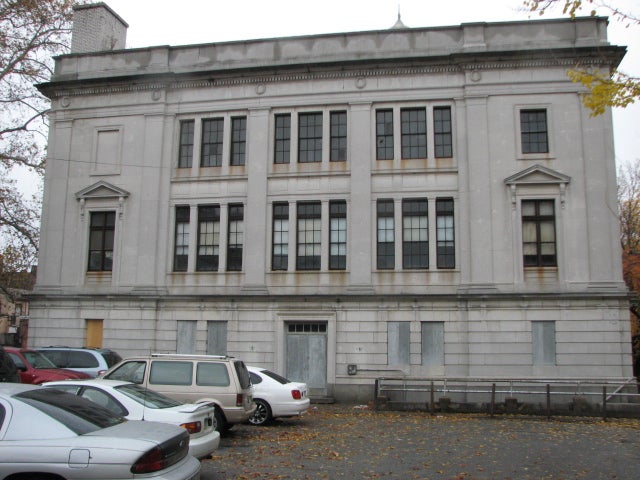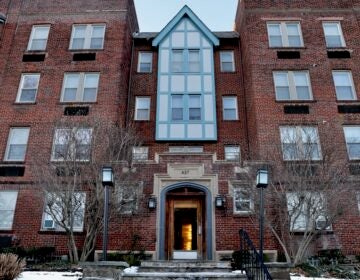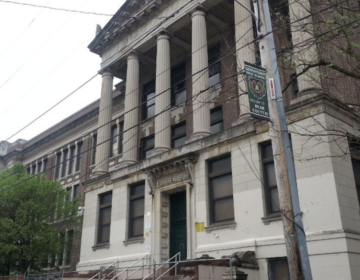Preservation Row: Germantown Town Hall

New series casts light on historic and unique sites that may be at risk of deterioration or demolition.
Nov. 07
By Alan Jaffe
For PlanPhilly
During the first part of the 19th century, the site at 5928 Germantown Avenue contained a city services building designed by Napoleon LeBrun and Sons, the architect of the Metropolitan Life Insurance skyscraper in New York.
In the 1860s, a civil war hospital operated at the same site.
In 1923, architect John Penn Brock Sinkler built the site’s current structure, Germantown Town Hall, modeled after William Strickland’s Greek Revival Merchant’s Exchange Building at 3rd and Walnut Streets.
So, David Young, board president of Historic Germantown, is concerned not only with the deteriorating condition of the cast stone and wood-trimmed Town Hall, with its distinctive bell tower and colonnaded rotunda. “It would be nice to see some measure of continuity for that site,” he said.
The Town Hall has appeared on the Endangered Properties List of the Preservation Alliance for Greater Philadelphia for several years now.
It had been used for city offices until about 1998, Young said, but has been vacant since then. “The exterior is now in poor to deteriorating shape. There are weeds growing out of it, the exterior marble is decaying, most of its copper and bronze features have been stripped away over the last five years.”
Objects have been thrown through some of the windows, all of the railings are gone, and debris is strewn around the entrance. The clock face turned toward the bustling section of Germantown Avenue is stopped at the eleventh hour.
Inside there are still historic treasures, according to the Preservation Alliance, including a clock made by Isaiah Lukens in 1828 that had hung in Independence Hall; World War I memorial tablets; and a bell by John Wilbank that was cast in the same shop as the Liberty Bell.
The City of Philadelphia still owns the property, and the Philadelphia Industrial Development Corporation is in charge of marketing and finding a new owner for the structure. PIDC real estate manager Liz Gabor said the non-profit corporation took over that role two years ago. The property was off the market for a time, then put back on the block about eight months ago.
Gabor has given a number of tours of the property to prospective developers. She has heard discussions about turning the Town Hall into an office space for artists, classrooms, or commercial space for an antiques auction dealer. “But there haven’t been any offers,” she said.
“There has been a lot of interest in the property. The difficulty is the level of repairs that are needed, and the configuration. It has very wide hallways, and the rotunda in front has tablets honoring fallen soldiers,” which would have to remain a public space. “It’s an attractive building, but there is some complexity in transitioning it to private use,” Gabor said, adding that PIDC would work with a developer and the Philadelphia Historical Commission to ensure the protection of its historic nature.
Rev. LeRoi Simmons, executive director of the Central Germantown Council, the community development corporation with jurisdiction over the Town Hall, said that while there have been numerous inquiries about the site, “they have come without sufficient funding to get it done.”
“The last estimates [for an office space proposal] looked like $10 million to $15 million to get it up and running in some way,” Simmons said
Ideally, the council would like to see the Town Hall transformed into a multi-use site, with social services, police facilities, political offices and a food court. “This is too critical and beautiful a structure to just let it go,” he said.
The Preservation Alliance has recommended that the city assess the condition of the building and its contents, take immediate action to protect the clock, bell and tablets and
secure the exterior shell of the building. It also suggested that a nominal lease be offered to a non-profit organization that could manage and restore the property, while other parts of the building are used for city offices serving Northwest Philadelphia and as retail space.
“We would like to see some responsible use for it, and prevent its destruction,” said Young. “Germantown Avenue is one of the longest historic districts in the country, and it is a disgrace what has happened to it. Town Hall is an example of that.”
Contact the writer at alanjaffe@mac.com.
Previous stories:
WHYY is your source for fact-based, in-depth journalism and information. As a nonprofit organization, we rely on financial support from readers like you. Please give today.






